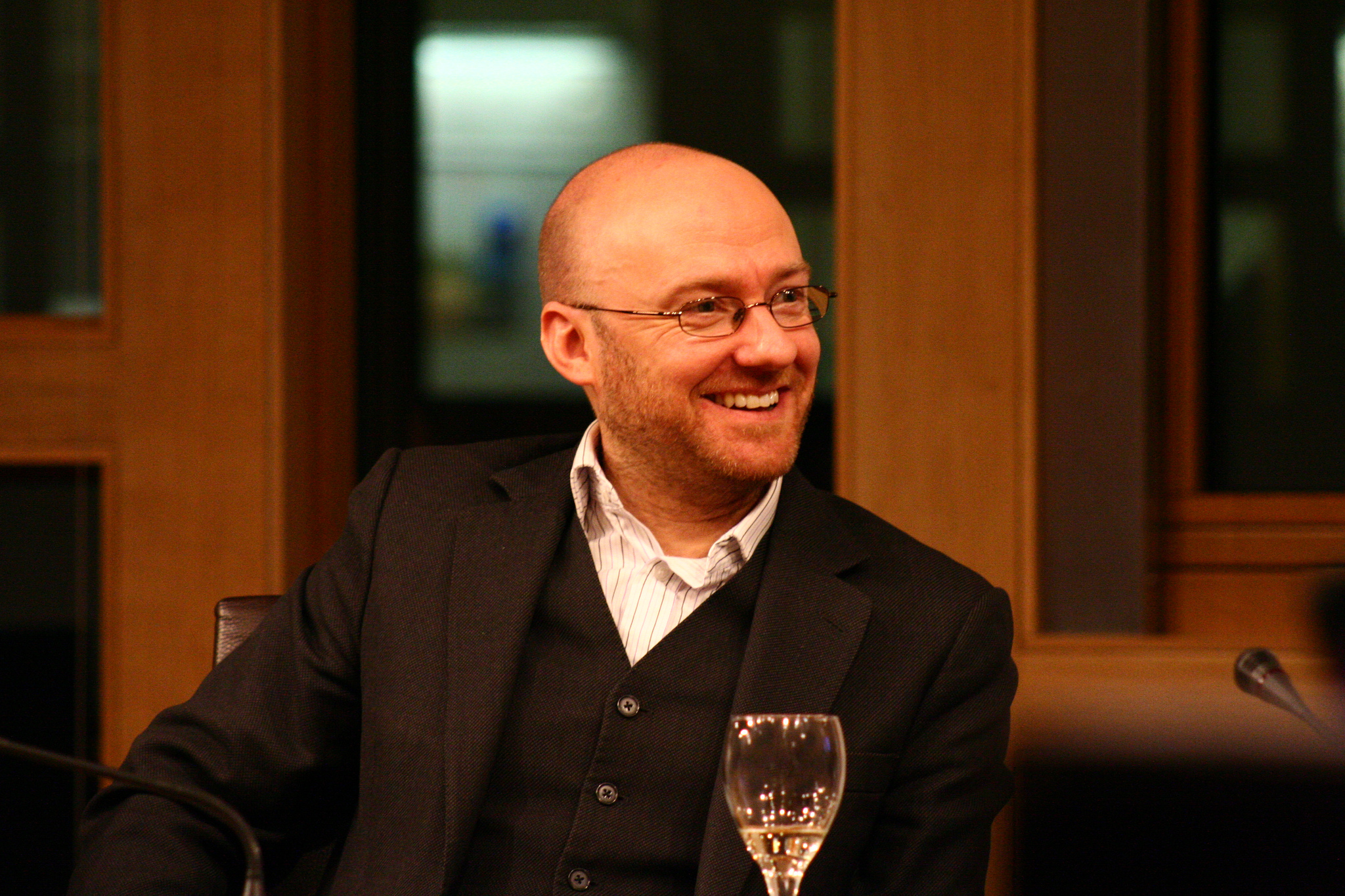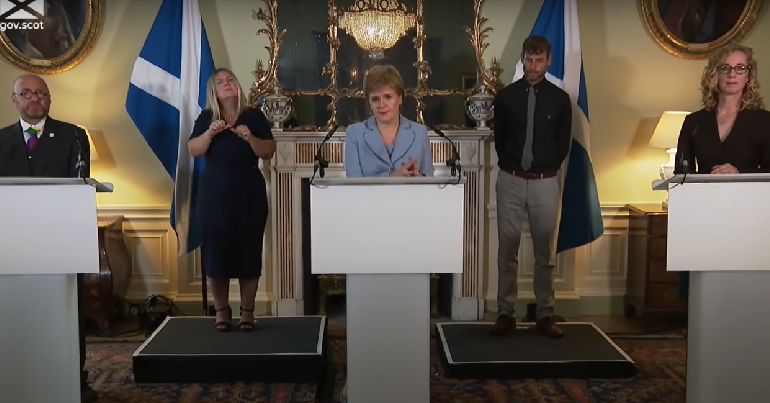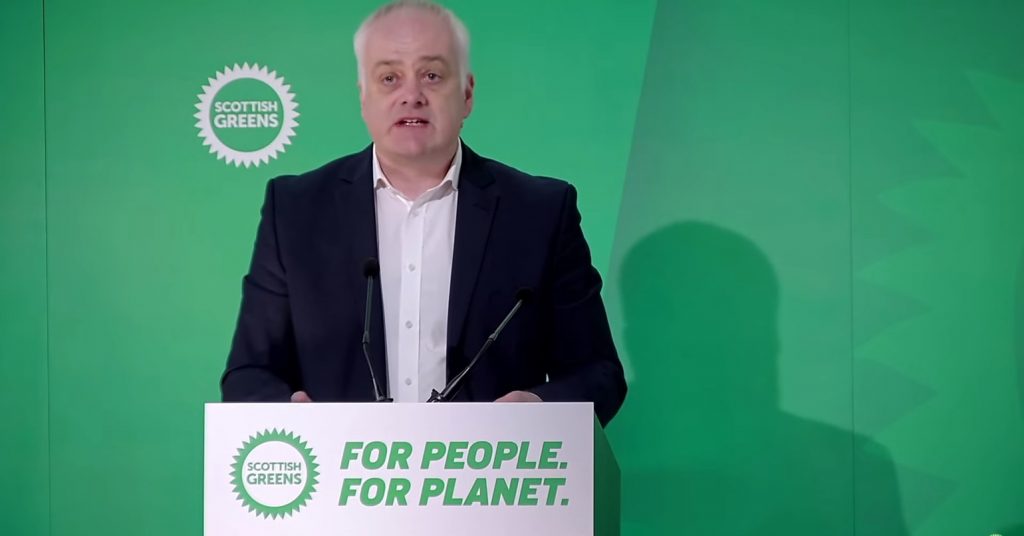Patrick Harvie: ‘minority of aggressive voices’ must not dominate next referendum

At the end of March, the Scottish Parliament did the political equivalent of a two-finger salute to Westminster – by voting for a second independence referendum.
While they don’t have the power to call one unilaterally – not an official one, anyway – the SNP couldn’t call it on their own: as a minority government, they had to rely on the Greens, led in Holyrood by co-leader and MSP Patrick Harvie.
I spoke to him at the Global Greens Congress in Liverpool last week, about what role the Greens will have in a future referendum campaign, and how they’ll be holding both Nicola Sturgeon and Theresa May’s feet to the fire during the Brexit process.
Josiah Mortimer: It’s been an interesting month or two for the Scottish Greens – what’s the mood in the party?
Patrick Harvie MSP: It’s good. A lot of Scottish Greens are very focused on the local elections that are coming up: it’s the biggest fall of candidates we’ve ever recruited – 220 – standing in the majority of local wards in Scotland. So we’ve not just got reach, but a stronger campaign in every sense.
There are huge tectonic plates shifting, and Greens are going to play an important role in both the Brexit and EU debates. But first of all we want to get councillors elected.
How important have the Scottish Greens been in pushing for the 2nd independence referendum?
There’s a Parliamentary arithmetic to it – if there’s going to be another referendum, there has to be legislation for it, and a majority in the Scottish Parliament. Having six votes in Parliament is obviously important in that.
We called for a Section 30 order [for a second indy ref] as long ago as October, because it was already clear that the UK government was going to pull Scotland out of the Single Market. That breaks a lot of their manifesto promises, and a lot of promises that Leave people were making in the EU referendum.
And it’s going to be profoundly damaging, not only to our economy but the social and environmental regulations that we have built up. You’ve got the Tories promising the same bonfire of regulations as Trump. The idea that we simply say nothing, shut up about it and get dragged along is just unacceptable.
Even the SNP will acknowledge that the campaign needs to be informed in a broader way than it was last time. We did our best in 2014 – we clearly got a lot of respect by running a Green Yes campaign, by specifically challenging the SNP on issues like the oil industry and the currency.
But I think they would acknowledge that their White Paper was the dominant narrative, and it was specifically an SNP prospectus – a manifesto from one party. The implication was that if you’re voting ‘Yes’, you’re voting for that.
I was voting for the principle of Scotland of the being an independent country, and I think that’s how it has to feel – about opening up the possibilities, not signing on to one party’s prospectus. So I think it needs to be a broader campaign.
So what would be the Green voice during the that campaign?
It’s interesting to see the SNP catching up with where we were in 2014. They’re clearly not able to rely on oil revenues – even if there were significant oil revenues for now, they’re clearly not going to last forever. I don’t want Scotland to go bust in the next 20 or 30 years. I want to see an independent Scotland that has viable prospects for a good quality of life in the long time.
On currency, they’re clearly having to recognise that a currency union with a country that’s not in the EU isn’t a goer.
In some ways, the simplest answer is: I don’t know what the campaign will look like, as we’re not there yet. And I think it would be foolish to suggest anyone has a complete answer to that yet.
How likely do you think it is that Theresa May’s veto of a 2nd referendum will hold?
Hopeful, and I think it’s entirely possible that the Scottish Parliament can extract some movement from the UK government on that.
Let’s look at the vast amount of legislation that the UK government has to progress if they want their Repeal Bill to give effect to Brexit – a lot of that will need legislative consent in Holyrood. It they stray beyond reserved powers into devolved powers, which they will inevitably have to do, that will require Scottish consent too.
If they give Henry 8th Powers to Scottish ministers, which they’re proposing to do, again there’s a huge amount which still requires approval. So they need the Scottish parliament to be working at some level cooperatively with their agenda.
Is that a threat for Greens to block legislation? Do you think it might come to that?
It’s not just the Greens, it’s all of us. Clearly the impetus is on the pro-independence voices in the Scottish Parliament who are in a majority, but I think it’s all of us. There has to be some level of give and take.
If they expect Holyrood to cooperate with that hugely burdensome legislative agenda, I think the reasonable expectation is that the UK government are willing to cooperate to some degree with the expectations of the Scottish Parliament to have a majority vote for a Section 30 order [for a referendum] respected.
The Great Repeal Bill is coming up – what is the Green priority for Scotland in holding back some of the deregulation that might be happening, holding back the ‘neoliberal tide’ that might be coming Scotland’s way?
Let’s assume the independence question will be tested but we don’t know what the result will be – if we are taken out of the EU and we’re still part of the UK, the immediate priorities have to be that the UK government’s legislation must not touch Schedule 5 of the Scotland Act – [i.e. they] must not change the devolved and reserved powers to remove powers from the Scottish Parliament, and must not stray beyond those reserved powers into devolved areas.
And if those Henry VIII powers are used we need to be holding ministers in both Parliaments to account. I’m going to be absolutely as vociferous in saying that if SNP ministers have those powers, they must not be used to undermine Parliamentary scrutiny.
How do you foresee Scottish public opinion changing the longer this stalemate goes on?
If the UK government dig their heels in and refuse to budge it may well harden views on both sides.
In the 2014 campaign, we were very conscious of the need to demonstrate that you can have this debate respectfully, that you can disagree and still be friends, and we wanted to strike that tone. I think it’s going to be even more important to do that this time around, because Scottish politics is already quite polarised around this, much more than at the start of the last campaign.
There’s a danger of a very hardened set of attitudes on both sides – we’re getting a huge amount of that from the keyboard warriors on the pro-UK side, and I’m sure other people are getting a lot of the same from keyboard warriors on the pro-independence side. Neither side must allow that minority of aggressive voices to dominate and to set the tone of the campaign as a whole.
Where public opinion stands now is far more pro-independence than it was at the start of the last referendum…
I think that’s clear. It’s very evenly divided at the moment. There are a lot of people anxious about the idea of another independence referendum. And a lot of people are angry about it as well. It’s very hard to see how people who are for both Unions [UK and EU] or against both Unions are going to be split if they’re asked to choose one.
Coming back to the Greens – what difference has having that huge increase in membership and MSPs had in your influence and ability to change things on the ground in Scotland?
The membership issue has been utterly transformational. In parts of the country where previously we barely existed, we’ve got that branch structure we’ve been lacking. And been able to be visible on a scale that we’ve only dreamed of in the past.
In parliamentary terms, having six MSPs in some ways feels to me like getting back to normal [Green representation went from one to seven members in Holyrood when Harvie was first elected]. But it makes a huge difference – having more heads to bounce ideas around, support for each other, folk around who can maintain the energy levels.
Having a small group of two…is really hard work and can be quite draining at times, trying to run a parliamentary group on that size, and have a voice, let alone any influence. This is the first time we’ve got both influence and voice.
I quite often laugh at those who pretend that we vote with the SNP on everything, yet at the same time are crowing about the number of votes the opposition has won in Parliament. That has only happened because we are willing to work with others when we think the government are wrong. We’re not willing to work against them opportunistically if we think they’re doing a good job.
Take the budget – Labour cannot bear the fact that we’ve reversed those cuts to local government, and they don’t get to point their finger at the SNP quite as much as they’d like. It’s a failure of responsibility from a Labour party that seems to think that their job in the context of a minority government is to make the government do worse, so that Labour can point at them and say ‘ah – they’re the bad guys’. That’s an absolute abdication of responsibility.
The job of opposition a minority is to make it better and that’s what we did with the budget. So we’ll work with the government on [some] issues, we’ll work against them on others.
Do you foresee within the next few years that the Greens could overtake the Labour party?
It’s certainly achievable – we did that in Glasgow Kelvin – it used to be solid Labour territory. We came second in that seat – one of the few constituencies we contested last year. I don’t think Labour expected that.
It’s slightly in the nature of Green politics to want to be part of the mix, but not to be the sort of hegemonic, dominant force that Labour was in the past and that the SNP are now. I don’t think that sort of politics is healthy.
What are your hopes for next month’s elections?
We’re certainly capable of doubling our number of councillors. We’re certainly capable of making a substantial increase in our presence in the two big cities where we currently have a sizeable group, Glasgow and Edinburgh. And I hope we’ll see a range of other councils across Scotland where we take our first presence onto the council landscape.
I really hope we not only increase our presence but achieve what our gender-balanced candidate selection process is supposed to do. We didn’t achieve that in Holyrood – we had a fully gender-balanced slate of candidates, but we just fell short in several regions, and we’ve got a lack of gender balance in our parliamentary group as a result of that. It’s something the party is very, very aware of.
We’ve got the biggest number of young Greens ever standing for council, and we’ve hit our target for gender balanced council candidates across the country. So I hope that we not only get more councillors but we get the kind of councillors that people will get real value from.
Last question – who should be the next Dr Who?
It’s only been a dream of mine since I was about four years old, so if they give me a call I won’t turn it down immediately. They’ve had a short bald companion for a while so maybe they’re just testing the water until the voters are ready for a short, bald Dr Who.
I do love the rumours that are flying around about Tilda Swinton – I’d be very surprised if she took on a long-running TV role. But I think she would make a fantastic Romana if they were to rewrite her as a character.
I hope they don’t go back down to the other end of the age spectrum and just have a pretty young man running around and being attractive – I think the Dr needs a darker edge than that.
And an MSP?
Well, who knows?…




Leave a Reply